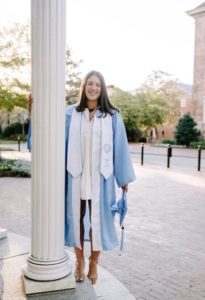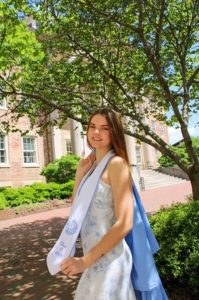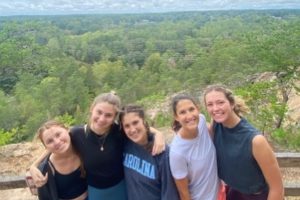By Auburn Robertson
According to the U.S. Department of Energy, “demand for clean energy is projected to increase dramatically as we work toward the nation’s climate goals to cut emissions in half by 2030, create an emissions-free power sector by 2035, and achieve net zero emissions economy-wide by no later than 2050.” As North Carolina and the broader United States make strides away from fossil fuels and towards clean energy sources to secure a more sustainable future, many UNC students and alumni are at the forefront of the transition.
Two such alumni are Bailey Pons and Hannah Stroot, both of whom graduated from UNC-Chapel Hill last May. While neither Pons nor Stroot entered UNC expecting to pursue a career in clean energy, both alumnae’s undergraduate experiences at UNC and as interns at the North Carolina Collaboratory led them to their current positions within the energy field post-graduation.
Charting a Career Path in Clean Energy
“I had no idea that I wanted to work in the energy sector. I came to Carolina pre-public health, but then, I took my first environmental-related class with Greg Gangi, and I decided to add on the environmental studies major,” explained Pons in a recent Zoom interview. “That was my first step into energy.”
 After adding her double major, Pons continued to explore the clean energy space through her coursework and various internships. During her junior year, Pons took part in an Environment and Ecology capstone course that assessed greenhouse gas emissions. She and her classmates worked to quantify the difference between campus greenhouse gas emissions during a “normal” year versus a year during the global COVID-19 pandemic. Additionally, Pons worked as a renewable energy intern at a leading clean energy developer, Madison Energy Infrastructure, throughout the summer before her senior year, where she continued to explore her interest in clean energy.
After adding her double major, Pons continued to explore the clean energy space through her coursework and various internships. During her junior year, Pons took part in an Environment and Ecology capstone course that assessed greenhouse gas emissions. She and her classmates worked to quantify the difference between campus greenhouse gas emissions during a “normal” year versus a year during the global COVID-19 pandemic. Additionally, Pons worked as a renewable energy intern at a leading clean energy developer, Madison Energy Infrastructure, throughout the summer before her senior year, where she continued to explore her interest in clean energy.
“I was doing mostly financial and legal work for [Madison Energy infrastructure],” said Pons. “And while that was not the best alignment with my interests, I still learned a ton about the industry itself, which was helpful in knowing and confirming that I wanted to go into the energy sector in general.”
Following her internship at Madison Energy Infrastructure, during her final year at Carolina, Pons’ decision to pursue a career in the clean energy industry post-grad was solidified through her year-long internship with the Collaboratory. As a policy intern, Pons was tasked with researching the Inflation Reduction Act and its effects on Duke Energy. According to Pons, this work confirmed her love for research and her interest in and passion for clean energy.
“The Collaboratory prepared me so well for post-grad. It is a great introductory experience for people who don’t yet fully understand a certain industry that they are interested in,” reflected Pons. “It’s such a great stepping stone for undergrads to understand how to be a sufficient individual too – from getting research papers done on top of schoolwork within a certain timeline to creating a mentor relationship to networking with others.”
The Collaboratory also introduced Pons to the full-time position where she currently works as a Wind Energy Workforce Development Researcher at the National Renewable Energy Laboratory. According to Pons, her role as a researcher is to “support and further develop any projects that [she] is assigned to, most of which focus on developing a workforce – whether that be through pathways like internships or transitioning workers from other nonrenewable industries – into the wind energy industry.” She currently supports a portfolio of around six projects with her day-to-day responsibilities ranging from conference planning to policy research regarding apprenticeships in the industry.
Reflecting on her current position in the clean energy field, Pons appreciates the industry’s flexibility.
“Specifically, within the energy sector, there are so many different types of energy sources that you can look into and new technologies,” said Pons. “There’s constantly new research coming out about energy too, which is awesome, and there’s so many different topical areas that you could focus on.”
A Focus on Energy Policy
Similarly to Pons, Collab alumna Hannah Stroot did not plan to pursue the clean energy field when beginning her time at Carolina. Rather, Stroot double majored in Economics and Public Policy and “just happened to fall into the energy field through internships.”
“Freshman year, I interned with the Town of Chapel Hill working on its Climate Action Plan, and I really enjoyed that,” said Stroot during a recent online interview. “So, that’s kind of where it all started.”
 Stroot went on to work as an intern for a clean energy lobbying firm in Washington, DC, and then as an Energy Transition Initiative Intern for the Collaboratory throughout her senior year.
Stroot went on to work as an intern for a clean energy lobbying firm in Washington, DC, and then as an Energy Transition Initiative Intern for the Collaboratory throughout her senior year.
“These internships are the main thing that I spent time on during undergrad,” said Stroot. “They allowed me to understand what I liked in a job and other aspects that I didn’t like, which is extremely valuable. These internships also just introduced me to energy as a field in general, which I feel like lots of undergrad programs outside of the environmental programs specifically, do not expose students to.”
During her internship with the Collaboratory specifically, Stroot focused on regulatory research surrounding the Energy Transition Initiative (ETI). According to Stroot, the ETI “is all about developing strategies to help North Carolina and the Southeast as a region have a necessary energy transition and have a future where there is reliable and affordable clean energy.”
“Doing technical research on these topics for the Collaboratory and being able to explain them to different types of people, like stakeholders, is such a useful and valuable skill for any job,” explained Stroot.
Like Pons, Stroot’s time working for the Collaboratory confirmed her interest in pursuing the energy field post-grad.
“I liked the problem-solving aspect of working around the energy transition,” said Stroot. “I think energy is a very pragmatic means of addressing the climate crisis, which makes me feel like I can have a large, direct impact.”
However, unlike Pons, Stroot decided to continue her higher education after receiving her undergraduate degree from UNC-CH rather than directly enter the workforce. Currently, she is enrolled in a year-long graduate school program at University College London: the Economics and Policy of Energy and the Environment MSc.
“For me, a big factor in deciding to go ahead and do grad school now versus down the line was convenience, because right now I don’t have other life aspects to consider like a family and those types of things,” said Stroot. “Also, I wanted to get more quantitative and technical skills in energy. I hadn’t focused on data analysis a lot in undergrad, which this program would do and set me up for jobs I felt that I wasn’t prepared for yet.”
Making the Most of the Carolina Experience

Although they chose different paths upon graduating, both Stroot and Pons are grateful for their time at Carolina and their ultimate decision to pursue the clean energy field, whether via higher education or a position in the workforce. Both Collab alumnae also emphasize the importance of staying open-minded and urge current undergraduate students to explore all of their interests, despite any initial plans they may have when starting at Carolina.
“Stay open to different fields that maybe you didn’t come into undergrad thinking that you wanted to pursue, and explore different interests that you have through internships, seminars, and coursework,” advised Stroot. “I mean, I never thought that I was going to go into anything energy-related, let alone even major in Econ, but here we are.”
“For current undergrad students, there are so many different careers and opportunities out there that you don’t even know exist,” echoed Pons. “Take courses that you are interested in, network with professors, join clubs and internships, and if you constantly work hard and be open, it will all work out.”
Auburn Robertson is a senior studying Environmental Science and Media & Journalism and is working as a communications intern with the Collaboratory for the 2024 spring semester.
